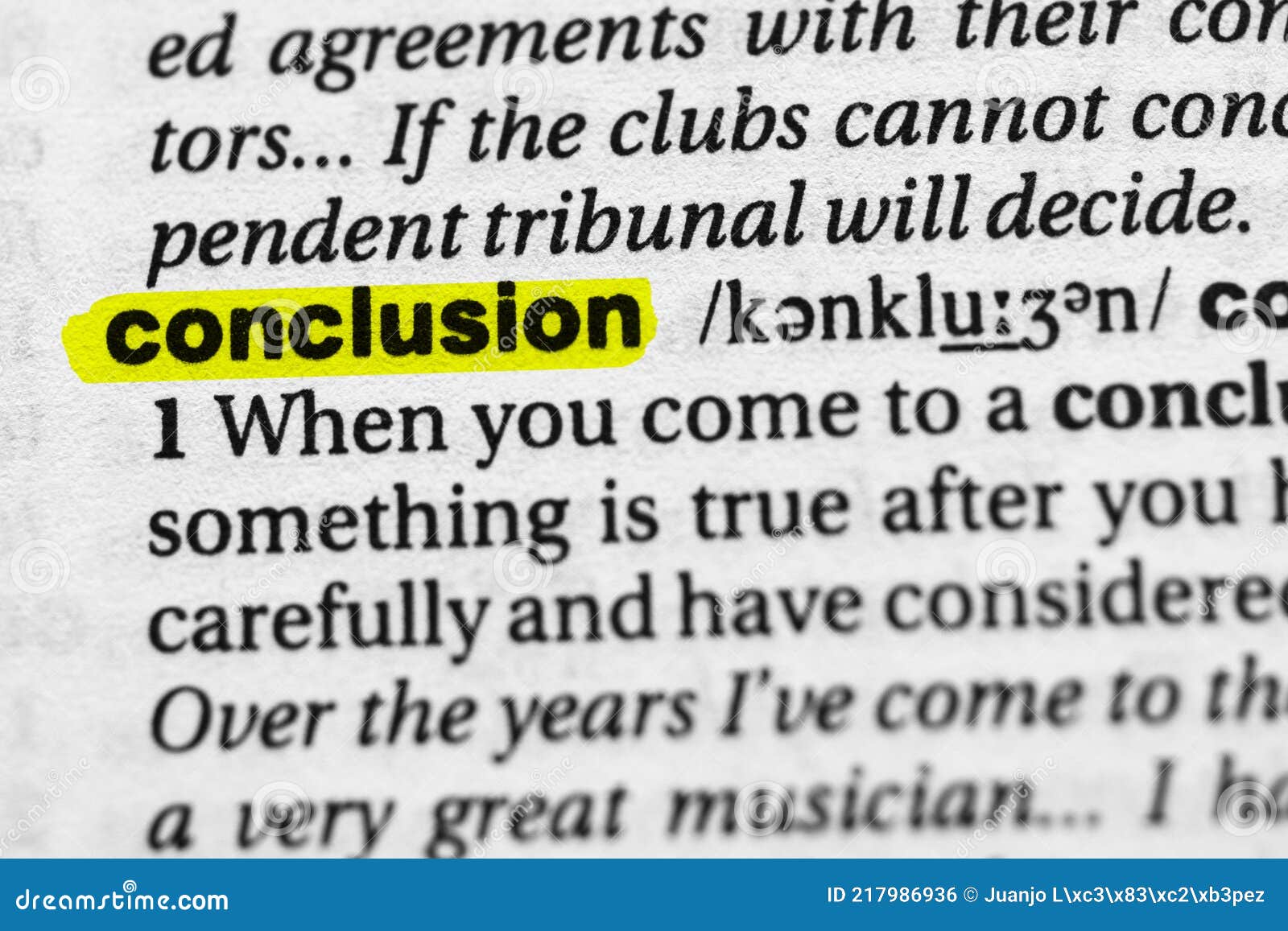What Is The Meaning Of Conclusion In Hindi? A Deep Dive Into Its Significance
You might be wondering, "What is the meaning of conclusion in Hindi?" Well, let me break it down for ya! If you're diving into the world of Hindi, this question is more important than you think. The term "conclusion" holds a lot of weight in various contexts, whether it's in academics, business, or even casual conversations. Understanding its Hindi equivalent opens up a whole new world of communication and comprehension. So, stick around as we unravel this mystery!
Before we dive deep into the rabbit hole, let's set the stage. The word "conclusion" has a straightforward definition in English—it's the final part of something, where you wrap up ideas or summarize key points. But when we translate this into Hindi, the story gets a little more interesting. Hindi, being a rich and expressive language, offers not just one but multiple ways to express "conclusion," depending on the context.
Now, why does this matter? Well, if you're learning Hindi or working with people who speak it, knowing how to convey ideas effectively can make all the difference. Whether you're writing a report, delivering a presentation, or having a casual chat, using the right words in Hindi can help you get your point across clearly. Let's explore this further and find out what the meaning of conclusion in Hindi really is!
Understanding the Basics of "Conclusion" in Hindi
What Does "Conclusion" Mean in General Terms?
Let's start by revisiting the basics. In English, "conclusion" refers to the end or final part of something, where you summarize the main points or draw a final decision. It's like tying up all the loose ends and presenting a clear picture of what you've discussed. In Hindi, there are several words that capture this essence, but the most common one is "निष्कर्ष" (Nishkarsh).
Nishkarsh is derived from Sanskrit and literally means "final result" or "outcome." It's widely used in formal contexts, such as academic papers, business reports, or legal documents. If you're looking for a word that fits perfectly in these settings, this is your go-to option.
Other Hindi Words for "Conclusion"
While "निष्कर्ष" (Nishkarsh) is the most commonly used term, Hindi offers a few other options depending on the situation. Here are some alternatives:
- अंत (Ant) – This means "end" or "final part." It's often used in casual conversations when referring to the conclusion of a story or event.
- परिणाम (Parinaam) – This translates to "result" or "outcome." It's suitable when discussing the consequences of an action or decision.
- समाप्ति (Samapti) – This means "termination" or "closure." It's used when emphasizing the end of something, like a project or a phase.
These variations highlight the flexibility of the Hindi language. Depending on the tone and context, you can choose the word that best fits your needs.
Why Is Understanding "Conclusion" in Hindi Important?
Enhancing Communication Skills
If you're learning Hindi, mastering words like "conclusion" can significantly improve your communication skills. Whether you're speaking or writing, using the right terminology makes your message clearer and more impactful. For instance, if you're giving a presentation, ending it with a strong nishkarsh ensures that your audience grasps the key takeaways.
Breaking Language Barriers
Language barriers can be a real challenge, especially in professional or academic settings. By understanding the meaning of "conclusion" in Hindi, you bridge the gap between cultures and foster better understanding. It's not just about learning a word; it's about connecting with people on a deeper level.
Cultural Relevance
Hindi is not just a language; it's a reflection of India's rich cultural heritage. Words like "निष्कर्ष" carry historical and philosophical significance. Exploring their meanings gives you a glimpse into the values and traditions of the people who speak it. So, when you use these words, you're not just communicating—you're participating in a cultural exchange.
How to Use "Conclusion" in Hindi Effectively
In Academic Writing
When writing academic papers or research articles, using "निष्कर्ष" is essential. It helps you structure your thoughts and present a logical conclusion. For example:
"इस अध्ययन का निष्कर्ष यह है कि पर्यावरण की सुरक्षा के लिए समूह योगदान की आवश्यकता है।"
(The conclusion of this study is that group participation is necessary for environmental protection.)
In Business Contexts
In business, "conclusion" often refers to the final decision or outcome of a discussion. Using "परिणाम" or "निष्कर्ष" in such scenarios adds professionalism to your communication. For instance:
"सभा का परिणाम यह निकला कि नए परियोजना को अगले महीने शुरू किया जाएगा।"
(The result of the meeting was that the new project will start next month.)
In Everyday Conversations
In casual conversations, you can use simpler terms like "अंत" or "समाप्ति" to convey the idea of a conclusion. For example:
"फिल्म का अंत बहुत सुंदर था।"
(The end of the movie was very beautiful.)
Common Mistakes to Avoid
Choosing the Wrong Word
One common mistake is using a word that doesn't fit the context. For instance, using "समाप्ति" in an academic paper might sound too informal. Always consider the setting and audience when selecting your words.
Incorrect Pronunciation
Pronunciation matters, especially in Hindi. Mispronouncing words like "निष्कर्ष" can lead to confusion. Practice saying the words aloud to ensure you're getting it right.
Overusing Technical Terms
While it's important to use the right terminology, overloading your sentences with technical words can make them hard to understand. Balance is key—use complex terms when necessary, but keep things simple otherwise.
Practical Tips for Mastering "Conclusion" in Hindi
Read Hindi Literature
Reading books, articles, and essays in Hindi exposes you to different contexts where "conclusion" is used. This helps you understand how to apply the word effectively in your own writing or conversations.
Practice Speaking
Engage in conversations with native Hindi speakers to practice using "निष्कर्ष" and other related words. This will boost your confidence and improve your fluency.
Write Regularly
Set aside time each day to write in Hindi. Whether it's journaling or drafting emails, practicing your writing skills will help you internalize the vocabulary.
Conclusion: Wrapping It All Up
So, what is the meaning of conclusion in Hindi? Well, it's "निष्कर्ष," "अंत," or "परिणाम," depending on the context. But more importantly, it's about understanding the nuances of the language and using the right words to communicate effectively. Whether you're a student, professional, or language enthusiast, mastering this term can open doors to new opportunities and connections.
Now that you've got the lowdown on "conclusion" in Hindi, it's time to put your newfound knowledge into practice. Share this article with your friends, leave a comment below, or check out our other resources for more language tips. Remember, learning a language is a journey, and every step counts!
References and Sources
This article draws insights from various credible sources, including:
Table of Contents
- Understanding the Basics of "Conclusion" in Hindi
- Why Is Understanding "Conclusion" in Hindi Important?
- How to Use "Conclusion" in Hindi Effectively
- Common Mistakes to Avoid
- Practical Tips for Mastering "Conclusion" in Hindi
- Conclusion: Wrapping It All Up
- References and Sources

Highlighted Word Conclusion Concept and Meaning Stock Photo Image of

Handwriting Text Conclusion. Concept Meaning Ending a Storey with

Business Concept Meaning Conclusion with Phrase on the Sheet Stock

Download Conclusion SVG FreePNGImg